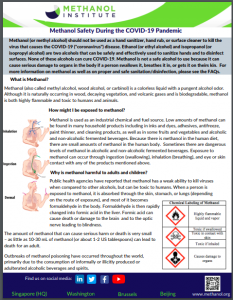Methanol Not Effective or Safe Hand Sanitizer or Disinfectant for COVID-19
Methanol should not be used in place of ethanol and isopropanol based hand sanitizers or as a disinfectant to clean surfaces.
Methanol (methyl alcohol) should not be used in place of ethanol (ethyl alcohol) and isopropanol (isopropyl alcohol) based hand sanitizers or as a disinfectant to clean surfaces. First, public health agencies have reported that methanol has a weak ability to kill viruses when compared to other alcohols and is less effective than other alcohols. Second, methanol is much more toxic than ethyl or isopropyl alcohols, so it can cause bodily harm when it comes in contact with skin, is swallowed, or is inhaled.
Ethanol and isopropanol are the alcohols approved by the US Food and Drug Administration (US FDA) for disinfection in health care settings, registered by the US Environmental Protection Agency (US EPA), and recommended by the World Health Organization (WHO) for use in alcohol-based hand rub formulations. Although methanol is an alcohol like ethanol and isopropanol, methanol cannot be used as they are because it breaks down and produces different chemicals in the body. Ethanol produces acetate in the body, isopropanol produces acetone in the body, and methanol produces formic acid in the body, which is more toxic and harmful than those produced by the other alcohols.
The use of methanol as a main ingredient in hand sanitizer has not been approved or recommended by any governmental authority. There are currently no regulatory safe levels for methanol in hand sanitizers or disinfectants. In the United States, products containing more than 4% methanol must be labeled as "poison." In Europe, products may contain up to 5% methanol in cosmetic and personal hygiene products. Methanol is an impurity sometimes present in ethanol, and therefore, small amounts can be present in ethyl alcohol-based hand sanitizers or rubs. Product specifications limit the amount of methanol in ethyl alcohol to 0.5% or 0.2 mL/L. Because methanol is an impurity in ethyl alcohol, it is not listed as an active ingredient on the product label.
Drinking methanol will not cure or protect adults or children from COVID-19 or other viruses, and instead may cause serious harm including blindness and death if people drink methanol or methanol-containing beverages.
“Methanol is an industrial product that is toxic and should not be used in hand sanitizers and surface disinfectants where there is a risk of exposure from skin contact, inhalation or ingestion,” said MI CEO Gregory Dolan. “Fatal incidents apparently from individuals drinking hand sanitizers are both tragic and avoidable.”
This fact sheet titled Methanol Safety During the COVID-19 Pandemic can be found here: https://www.methanol.org. The fact sheet was prepared for the Methanol Institute by Gradient, an environmental and risk sciences firm.
The Methanol Institute serves as the trade association for the global methanol industry.
Lawrence Navin
Methanol Institute
+1 703-618-2224
email us here
Legal Disclaimer:
EIN Presswire provides this news content "as is" without warranty of any kind. We do not accept any responsibility or liability for the accuracy, content, images, videos, licenses, completeness, legality, or reliability of the information contained in this article. If you have any complaints or copyright issues related to this article, kindly contact the author above.

